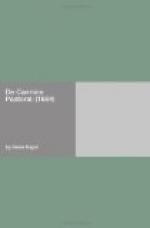{4} The Muses that the Country Love.
Which Observation was first made by Mnasalce the Sicyonian in his Epigram upon Venus
The Rural Muse upon the Mountains feeds.
For sometimes the Country is so raveshing and delightful, that twill raise Wit and Spirit even in the dullest Clod, And in truth, amongst so many heats of Lust and Ambition which usually fire our Citys, I cannot see what retreat, what comfort is left for a chast and sober Muse.
And to speak from the very bottome of my heart, (not to mention the integrity and innocence of Sheapards upon which so many have insisted, and so copiously declaimed) methinks he is much more happy in a Wood, that at ease contemplates this universe, as his own, and in it, the Sun and Stars, the pleasing Meadows, shady Groves, green Banks, stately Trees, flowing Springs, and the wanton windings of a River, fit objects for quiet innocence, than he that with Fire and Sword disturbs the World, and measures his possessions by the wast that lys about him: Augustus in the remotest East fights for peace, but how tedious were his Voyages? how troublesome his Marches? how great his disquiets? what fears and hopes distracted his designs? whilst Tityrus contented with a little, happy in the enjoyment of his Love, and at ease under his spreading Beech.
Taught Trees to sound his Amaryllis name.
{5} On the one side Meliboeus is forc’t to leave his Country, and Antony on the other; the one a Sheapard, the other a great man, in the Common-Wealth; how disagreeable was the Event? the Sheapard could endure himself; and sit down contentedly under his misfortunes, whilst lost Antony, unable to hold out, and quitting all hopes both for himself and his Queen, became his own barbarous Executioner: Than which sad and deplorable fall I cannot imagine what could be worse, for certainly nothing is so miserable as a Wretch made so from a flowrishing & happy man; by which tis evident how much we ought to prefer before the gaity of a great and shining State, that Idol of the Crowd, the lowly simplicity of a Sheapards Life: for what is that but a perfect image of the state of Innocence, of that golden Age, that blessed time, when Sincerity and Innocence, Peace, Ease, and Plenty inhabited the Plains?
Take the Poets description
Here Lowly Innocence makes a sure retreat, A harmless Life, and ignorant of deceit, and free from fears with various sweet’s encrease, And all’s or’e spread with the soft wings of Peace: Here Oxen low, here Grots, and purling Streams, And Spreading shades invite to easy dreams.
And thus Horace,
Happy the man beyond pretence
Such was the state of Innocence, &c.




